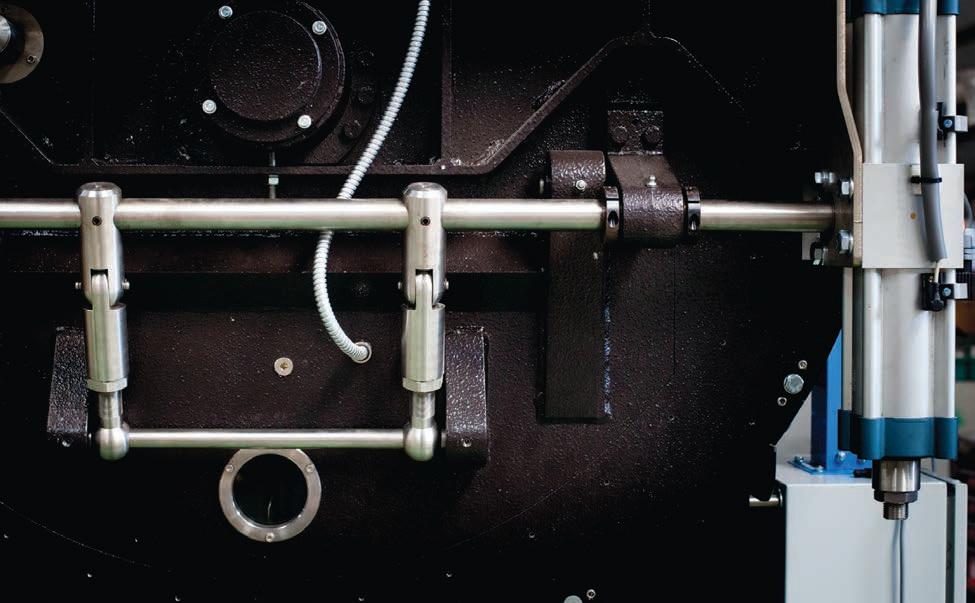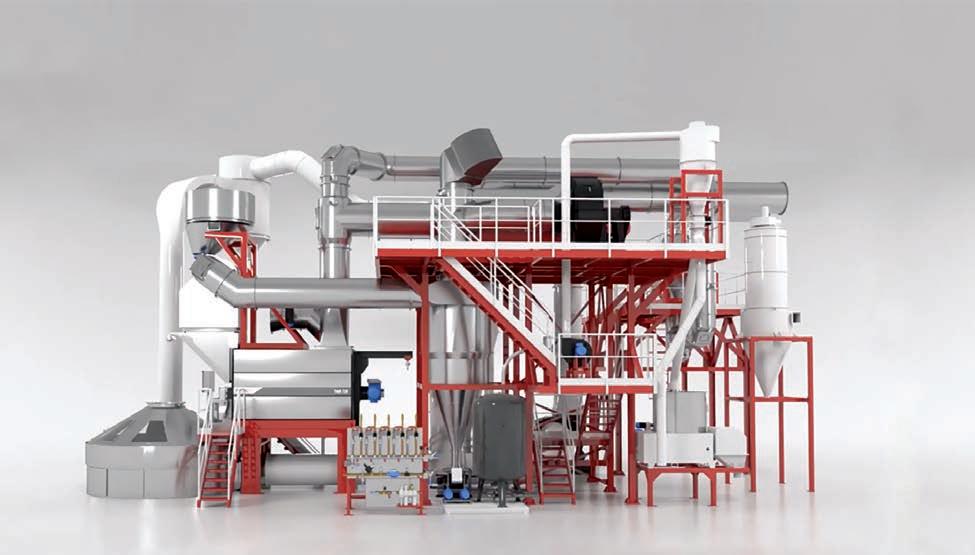
7 minute read
LASTING LEGACY
Leading legacy
IMA COFFEE PETRONCINI ON HOW THE ROASTER MANUFACTURER HAS STAYED AHEAD OF THE CURVE FOR MORE THAN A CENTURY.
Petroncini has been a leading force in coffee roaster manufacturing for more than a century.
Since Ruggero Petroncini founded the company in 1919, Petroncini has become globally renowned for its quality manufacturing of roasters, using a cast iron material that has become synonymous with the Italian manufacturer.
The company grew to offer complete coffee plant solutions, encompassing green bean coffee intake, fully automatic roasting, storage and degassing systems, and joining with IMA Coffee in 2018 extended the reach of Petroncini even further.
“We continue to innovate in our field and are always developing our roaster engineering and design to reach the highest productive efficiency,” says Maurizio Mazzoni, IMA Coffee Petroncini R&D Manager.
Research and development have been a core pillar of Petroncini since its founding. Mazzoni says the company’s many milestones have kept the choice of materials used and its improved product engineering front and centre. This is evident in the roaster’s TT Traditional Roasters range.
“The innovation applied to these machines over the years has in no way affected the quality of the materials and the robustness of the original product, but instead has set out to put the master roaster at the centre of the process.” Thanks to heat control, roasting air volume and the drum rotation speed, Petroncini TT Model allows the operator to vary their method of transferring heat to the bean, achieving a perfect balance between convection and conduction. “We are always saying that creativity in personalising the product is in the hands of the roaster, and we want to provide all the tools capable of turning that creativity into reality,” Mazzoni says. “We can thus succeed in achieving countless sensory profiles, developing the coffee’s deepest aromas, from light roasting to the very darkest.”
The TT Specialty Roasters can roast up to 80 kilograms per hour and are suitable for specialty coffee roasteries, coffee shops, or pilot plant machines. For more medium-sized businesses, Mazzoni recommends the larger TTA models.
“Ranging from 240 up to 1600 kilograms per hour capacity, TTA Roasters allow the roaster to meet a wide range of customer requirements,” he says. “TTA Roasters facilitate coffee with a dense and rich aroma. The air convection technology allows a perfect coffee roasting control, optimising the thermal efficiency and the flavour development.”
The TTA roasting chamber is designed to provide a homogenous heat supply to the coffee beans, through both the modulation of the air flow volume and contact with the insulated surface of the drum. A recent development to the TTA series is the introduction of the new Opera30 roasting control, which Mazzoni calls the ideal partner to have the full control of the roasting process.
“Opera30 allows you to customise recipes and process parameters in a flexible and quick way, managing the curve either by temperature or by time variables, obtaining the desired sensory profiles with the guarantee of perfect repeatability of product quality over time,” he says.
The roasting data and profiles are saved within the system and available at any time. They can be organised thanks to the Roasting Manager, another new application integrated into Opera30.
The system shows a preview of stored roasting curves, comparing them with the actual rate-of-rise of the product in progress. Any profile modification during the process can be manually adapted by changing the product temperature and process parameters, to adjust
the actual curve with the one set up.
IMA Coffee Petroncini has also introduced a different, but just as impressive, new control software to its flagship TMR series called Orchestra.
With Orchestra, the person responsible for creating the roasting profile can set up to 30 cooking set-points, including the temperature to reach and the time interval in which to reach it, as well as drum rotation speed and the flow rate of the heating fluid for each set point.
“During the setting of the various setpoints, Orchestra shows a simulation of the roasting profile and the ending time estimated, allowing the operator to preview the final result,” Mazzoni says.
TMR720 can roast up to 3600 kilograms per hour capacity
“During roasting, Orchestra allows you to view the curve in progress alongside the preset profile in progress and these two profiles will overlap in the visualisation of the roasting trend, thanks to the precise self-tuning of the process parameters.”
“Orchestra is the answer to the need to obtain constant roasting results over time, especially for products such as pods and capsules, eliminating external influences like the humidity of green coffee, the quantity of the batch entering the roaster, and environmental variables,” Mazzoni says.
TMR models are modular drum roasters with a 90 per cent convection to 10 per cent conduction ratio, suitable for a wide range of coffee roasting profiles, and with a capacity to roast from 1000 to 3600 kilograms per hour.
“The TMR model roaster is the first drum roasting machine engineered with the roasting air Recirculation and Heat Recovery System. The first one was engineered by the pioneer of the modular drum roasting technology, my master in roasting engineering Stefano Farina. The first prototype was installed in 1995 in Chile indeed,” Mazzoni declares. “The technology is now so efficient it allows us to have no more than one second – ending time – difference between one batch and the next, so consistency is extremely high.”
The TMR uses just one burner as a heat generator and after burner to reduce its carbon emissions. Mazzoni says the TMR saves, on average, 30 to 35 per cent more energy compared to traditional roasters, and this focus

The TMR720 can roast up to 3600 kilograms of coffee per hour.
on sustainability will only become more important in the future.
“Our commitment in sustainability is evident in every roasting solution we offer. Our goal is to find the best emission solution for all our customers, from the small specialty roasters to the biggest roasting plants all over the world, carrying out the best sustainable practices for every coffee processing plant,” Mazzoni says. “We can supply a small catalyser just for roasting odour abatement, suitable for small roasting shops located near the city centre or residential areas, afterburner for a standard abatement, and big catalyser to control both NOx and VOC emissions of larger roasting plants.”
One the biggest focus of Petroncini’s R&D in 2022 will be green roasting technology indeed.
“Our intention is to revise and implement all the aspects of the roasting machine and plant equipment with the goal to further overcome our commitment on the environment safeguarding,” Mazzoni says. “Sustainable practices are always on the go and our ultimate goal is to minimise environmental impact in industrial coffee manufacturing. Our R&D team is currently working on a new green roasting technology that can be a further flagship in the IMA ZERO sustainability program. We want to further expand the concept of recycling, preserving the resources and maximise energy efficiency.”
With 5 per cent of IMA Coffee Petroncini’s budget dedicated to research and development, the manufacturer has strengthened its R&D team dedicated to important projects related to Industry 4.0.
Following a more than US$2 million investment, all of IMA Coffee Petroncini’s current and future developments will be on display in the IMA Coffee Lab, a 2000-square-metre facility set to open in 2022.
“The IMA Coffee Lab is a visualisation of a full industrial pilot plant within our own factory. It will demonstrate everything we are capable of producing – green coffee intake, cleaning with optical sorting, our two types of roasting options – traditional and modular, storage, degassing systems, grinding, and different packaging machines for capsules and vertical bags. The product analysis lab, tasting room and coffee academy complete our custom-oriented vision of the IMA Coffee Lab,” Mazzoni says. “It will be the centre of our R&D projects and we are thrilled to welcome our customers and partners to test it, providing us new challenging goals to achieve.”
Another project already in progress in the IMA Coffee Lab is AI-learning to Roast, a new control model that uses machine learning intelligence to automate the roasting process and ensure product consistency. Mazzoni says Petroncini has partnered with an American university to explore the best way to apply artificial intelligence to coffee roasting.
“More specifically, Machine Learning applied to Orchestra is expected to increase the reliability, especially on the setting-up of new non-conventional roasting profiles and during frequent recipe changes, anticipating unexpected situations and minimising the fine-tuning operations. The final added value of the project will result in reduced time-to-commissioning and, therefore, reduced time-to-market,” Mazzoni says. GCR
For more information www.petroncini.com










